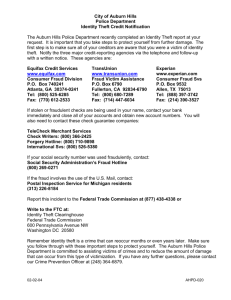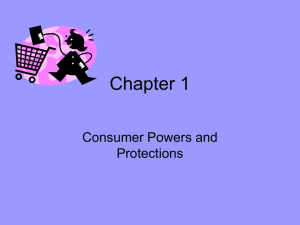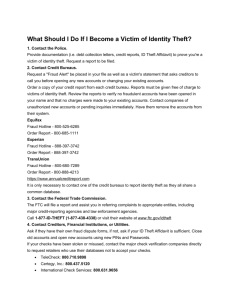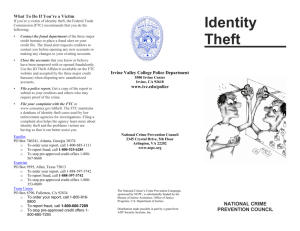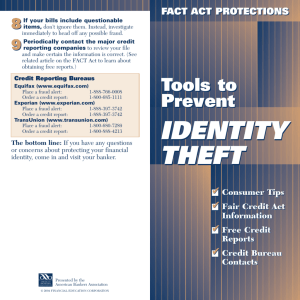Identity Theft - The Florida Bar
advertisement
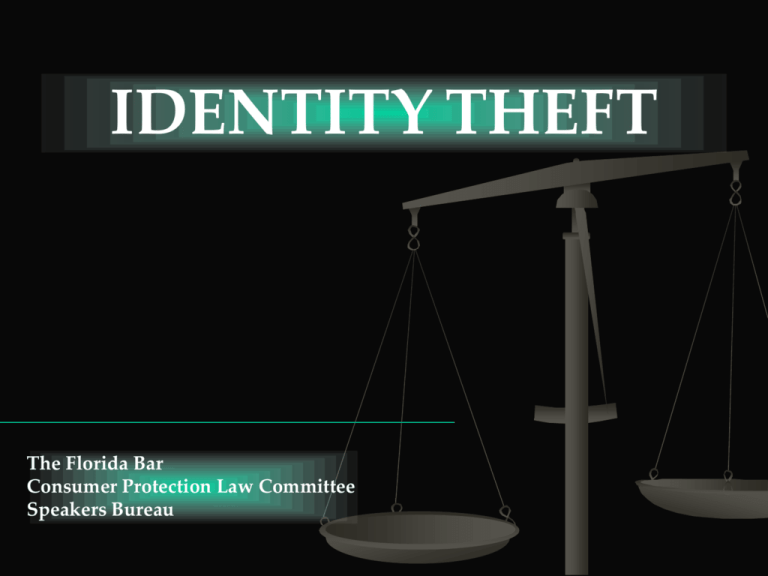
IDENTITY THEFT The Florida Bar Consumer Protection Law Committee Speakers Bureau What is Identity Theft? Identity Theft is the criminal act of taking a victim’s identity for the purpose of: Obtaining credit Credit card Stealing money from existing accounts Obtaining Employment Filing Bankruptcy Leasing Automobiles How Does Identity Theft Occur? All that is needed is your social security number, birth date, address, phone number, or any other information which can be discovered. Dumpster Diving Skimming Phishing Changing Your Address Old-Fashioned Stealing Dumpster Diving Thieves rummage through trash looking for bills, or other paper with your personal information on it! Skimming Thieves steal credit/debit card numbers by using a special storage device when processing your card. Pfishing Thieves pretend to be financial institutions and send spam or pop-up messages to get you to reveal your personal information. Gimme your Social Security Number!!! Changing YOUR Address Thieves divert your billing statements to another location by completing a change of address form. Just Plain Stealing Thieves steal wallets and purses; mail, including bank and credit card statements; pre-approved credit offers; and new checks or tax information. What They Do With Your Info Credit Card Fraud Phone/Utilities Fraud Bank fraud Government Documents Fraud Rental Employment FTC Complaints 246,847 260,000 255,565 26% Credit Card Fraud 250,000 240,000 230,000 215,177 Complaints 220,000 210,000 200,000 190,000 2003 2004 2005 Top Florida Cities for Fraud City No. Miami 2,463 Orlando 1,019 Tampa 749 Jacksonville 739 Fort Lauderdale 394 18-29 Years Old 26% National Forms of ID Theft Other Identity Theft 25% Attempted ID Theft 6% Credit Card Fraud 26% Loan Fraud 5% Government Documents Fraud 9% Phone/Utilities Fraud 18% EmploymentRelated Fraud 12% Bank Fraud 17% Specific Laws Addressing ID Theft Florida Law Section 817.568, Florida Statutes Criminal Use of Personal Identification Information Up to 10 Years Imprisonment depending on amount of money stolen. Specific Laws Addressing ID Theft (Cont’d) Federal Laws There are both civil and criminal federal laws addressing ID Theft: Identity Theft and Assumption Deterrence Act, 1998 knowingly transfers or uses, without lawful authority, a means of identification of another person with the intent to commit, or to aid or abet, any unlawful activity that constitutes a violation of Federal law, or that constitutes a felony Under any applicable State or local law. Up to 30 years Violations of the Act are investigated by federal investigative agencies such as the U.S. Secret Service, the FBI, and the U.S. Postal Inspection Service and prosecuted by the Department of Justice. Prevention Tips Personal Financial Matters: Order and Review Copies of Your Financial Report from each national reporting agency every year: Equifax: 1-800-525-6285; www.equifax.com; P.O. Box 740241, Atlanta, GA 30374- 0241 Experian: 1-888-EXPERIAN (397-3742); www.experian.com; P.O. Box 9532, Allen, TX 75013 TransUnion: 1-800-680-7289; www.transunion.com; Fraud Victim Assistance Division, P.O. Box 6790, Fullerton, CA 92834-6790 Prevention Tips Empty Your Wallet of Extra Credit Cards and ID Shred all Financial Documents You Plan to Discard Only Release Personal Data to Agencies who require it to Initiate Certain Actions DMV Can Issues DLs without Your Social Security Numbers Ensure your PIN Numbers Cannot Be Viewed by Others When Entering it into an ATM Shred all Financial Receipts and Never Leave Them at the Retail Location Do Not Keep Passwords or your Social Security Number in Your Wallet Remove Mail Promptly from Your Mailbox Deposit Outgoing Mail in locked Post Collection Boxes Use Caution When Supplying Your Financial Information Over the Internet What if You Become a Victim? Call Your Credit Reporting Agencies: Experian, Equifax, and TransUnion Close Accounts and Alert Fraud Departments of Each Company Where an Account Was Opened or Changed Without Your Permission File a Police Report with Your Local Authorities, Your State Attorney General, and the Federal Trade Commission Examples Of Cases In the Southern District of Florida, a woman was indicted and pleaded guilty to federal charges involving her obtaining a fraudulent driver's license in the name of the victim, using the license to withdraw more than $13,000 from the victim's bank account, and obtaining five department store credit cards in the victim's name and charging approximately $4,000 on those cards. In the Middle District of Florida, a defendant has been indicted on bank fraud charges for obtaining names, addresses, and Social Security numbers from a Web site and using those data to apply for a series of car loans over the Internet. Contact Information FTC's Identity Theft Clearinghouse 1-877-IDTHEFT Department of Highway Safety and Motor Vehicles Fraud Section 850-617-2405 Attorney General Fraud Hotline 1-866-966-7226
